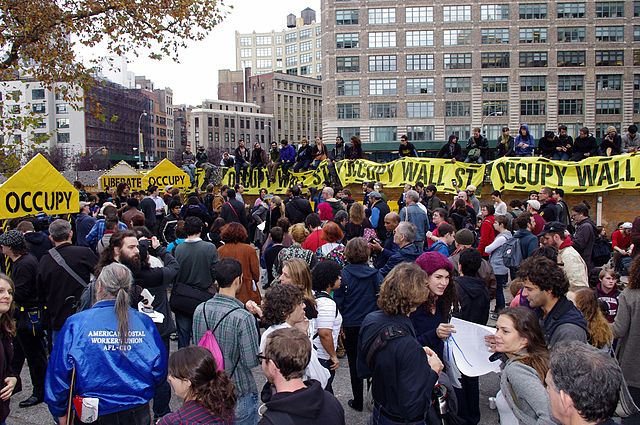The Occupy movement that has spawned campsites and protests in city centers across the world has arisen out of a sense of urgency and frustration with the power structure as it is, a Columbia University political scientist told an audience gathered for a Dec. 2 forum.
“I think that we’ve been in that moment of crisis for a long time and finally we have a sense that the political system is broken and we have to go outside of the routine channels,” said the speaker, Dorian Warren.
The afternoon forum, held at at the Busboys and Poets cafe located on K Street, was hosted by the Kalmanovitz Initiative for Labor and the Working Poor at Georgetown University, an organization with a goal of developing creative ideas and practical solutions for working people.
Warren shared the conclusions of a study group he worked with over the summer that explored how such movements are built. The group came up with five components that mark successful social movements. They have clarity of purpose, relentless outreach, they provide space for authentic conversation and debate, engender leadership and master the use of the media.
The Occupy movements have used social media to send out demands for change. In spirit, some parallels can be drawn between the Occupy movement and earlier campaigns, such as the civil rights movement, the women’s liberation movement and the fight for lesbian, gay, bisexual and transgender rights. Yet in the case of the Occupy movement, the goals are somewhat broader and harder to define, Warren acknowledged.
“I’ve had multiple conversations with different people and they’re always asking ‘where is the movement going?’ or ‘what are the demands?’” But the movement is still new and still evolving, Warren said.
“The civil rights movement was roughly 14 years—we’re two months in and movements obviously can take a while.”
Among its far-reaching goals, the movement has committed to working for fundamental changes to the structure of society, incremental changes to national policy and a redefinition of democracy that would give people who have been disenfranchised a voice, Warren said.
And even if those goals may be broad and sweeping, Warren suggested that Occupy can already claim success in raising serious questions about justice and democracy.
“Another accomplishment of Occupy has been to challenge and transform political discourse,” said Warren. “ If you look at counts of the words ‘inequality’, and ‘greed’ in the media, there’s a flat bar of zero in the media until Sept. 17 when it shoots up just like that.”
The movement’s reclaiming of public space has helped dramatize its push to redefine democracy, Warren added, speaking just two days before 31 Occupy DC protesters were arrested for attempting to erect a wooden shelter at McPherson Square park, not far from the cafe where the forum was held.
“The occupation is a tactic. It may not be a popular one, but it is a tactic,” Warren said. “A lot of people keep asking—‘Why occupy the parks, why the tents?’—it opens up the space to be creative and innovative. We have to keep pushing on occupying public space…no matter
where it is—that’s what is going to push society…push the world to think differently…no matter how unpopular the tactic.”
Paul Adler, a Georgetown University history major, spoke of the need to set shorter term goals so that progress might be more easily measured.
“People want to see change. Perhaps if they win smaller and more concrete victories that give people more hope for the future, such as stopping foreclosures, reopening public spaces, aiding community groups of labor in struggle to push over to victory,” Adler said.
Sheika Reid, a supporter of Occupy DC, acknowledged that confusion might remain about the ultimate goal of the occupations, here in the District and across the country. She tried to state that as clearly as possible.
“I feel like we live in a society where a majority of the people who make decisions that affect the rest of society are paid off and a lot of them are making decisions in ways that would benefit a very small group rather than the larger group,” Reid said. “Occupy is about leveling out our power structure so that there is more power within the people instead of centralizing at the top.




